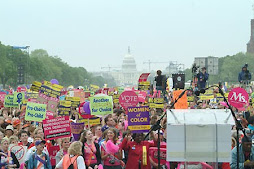A fantastic, well researched, thought provoking, and insightful article in Mother Jones, by Julia Whitty called "The Last Taboo" is a must read on the urgent need for population control.
It poses some challenging questions to those of us in the reproductive justice movement, especially to the very many of us who find it impossible to separate social justice from ecological justice. Where will we find the balance of personal freedom and social and ecological responsibility? I don't know the answer, but I know it is urgent to do so.
While you're there, read Masters of the Uterus. Again, really thought provoking. I wish they had also included some of the big moments in Canon law and English Common Law, like:
1140: First authoritative collection of canon law states that early abortion is not homicide and accepts the views of both St. Augustine and early Christian theologians (and Aristotle, for that matter) that "animation," or the coming alive of the fetus occurrs forty days after conception for a boy and eighty days after conception for a girl. (By the way, this is one of my most favourite historical sexist facts and a good one for any righteous patriarchy blamer to know.)
1327: The "Twinslayer's Case" in England in which the Roman Catholic judge refused to make causing the death of a fetus a legal offence. The same happened again in the "Abortionists's Case" of 1348, with another Roman Catholic judge.
1591: Pope Gregory XIV declared that early abortion was not grounds for excommuncation, a policy which continued in the Catholic Church until 1869.
1670: The question of whether abortion was murder came again before an English judge, Sir Matthew Hale. Hale decided that if a woman died as a result of an abortion, the abortionist was guilty of murder. The concern was for the life of the woman, not the fetus.
The source for the above four fantastic facts is a great little booklet called "Abortion in Law, History & Religion" by Childbirth by Choice Trust.
skip to main |
skip to sidebar

March for Women's Lives, April 2004

Washington, April 2004



Popular Posts
-
I love irony. As the forty days of harassment continues, my local abortion clinic finds itself having to continually remind the anti-choice ...
The Abortion Monologues
March on Washington

March for Women's Lives, April 2004
Blog Archive
-
▼
2010
(53)
-
▼
June
(15)
- The last word on the maternal health initiative.
- Ottawa report
- Next Show: Sunday June 27, 2010
- More on Women, Harper and the G8
- Can of Worms: The New Brunswick Situation and anti...
- Thanks to Alumnae Theatre
- Access still a problem
- Toronto Show June 20 SOLD OUT
- That which must not speak it's name
- How do women feel after an Abortion? Relieved.
- Cultural Imperialism and Abortion
- Facts, Propaganda and Somerville
- Anti-Feminist Feminists and abortion
- G8 and the Maternal Health Initiative Commentary
- Upcoming shows
-
▼
June
(15)
If you're against abortion....

Washington, April 2004
This is What a Feminist Looks Like

Another definition of pro-choice

Washington, April 2004

My Blog List
-
-
Battle Cry3 years ago
-
JUXTAPOSE!!! Two wankers.5 years ago
-
-
-
Hello world!8 years ago
-
So Many Things Left11 years ago
-
-
-
-
Links
To see Links I like, head back to the website at http://www.abortionmonologues.com/
Recently, I found this site - CPC Watch. Check it out!
http://cpcwatch.org
Recently, I found this site - CPC Watch. Check it out!
http://cpcwatch.org
